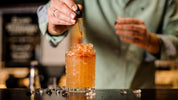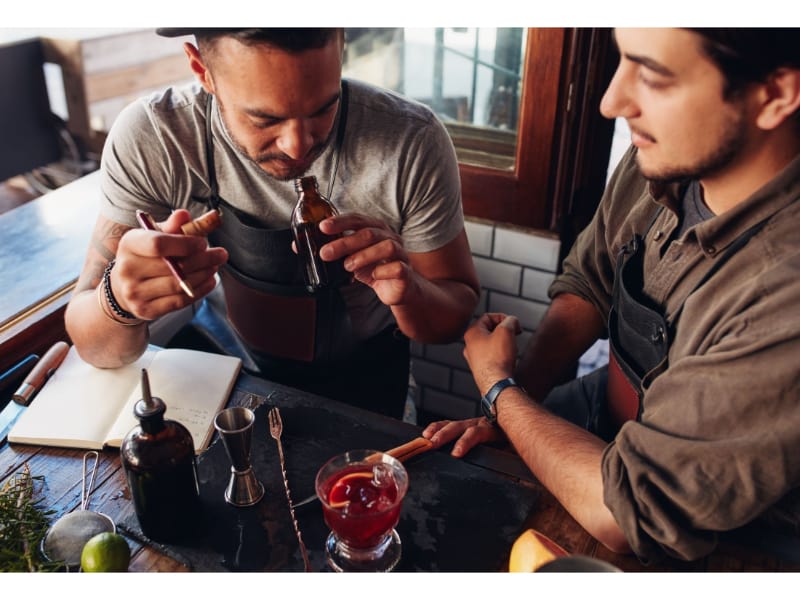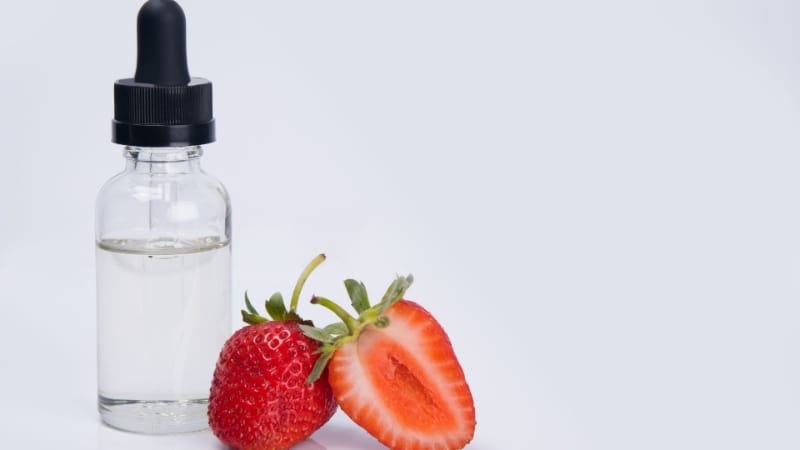
What Are Bitters? Complete Guide On How To Use Them & Why


Bitters refer to any type of liquor created using plant and natural herb flavors. By liquefying the natural herbs and adding them to alcoholic drinks, bitters create a more complete and well-balanced flavor profile.
You might have noticed that these little magic potion bottles are essential in many favorites, from Manhattans to Planter’s Punch. But are they mainly used to enhance the taste of world-famous cocktails? Read on to learn more about bitters, their different types, and the role they play in the art of mixology, medicine, and cooking.
Before being a staple ingredient in cocktails, bitters were first created and used to aid in human digestion problems. In 1824, a German physician in Venezuela was trying to find a remedy for stomach maladies and malaria. After conducting several tests and research, he began making Angostura bitters.
This first type of bitter was named after the town, Angostura in Venezuela. Later on, when people became more oriented with cocktails, bitters were already used in every bar in the city.

Cocktail bitters are made from botanical ingredients such as aromatic herbs, bark roots, cascarilla, cassia, gentian, orange peel, and cinchona bark. Usually, the production of bitters includes water and alcohol wherein the latter acts as a solvent for the ingredients. Meanwhile, the alcohol strengthens the flavor of the ingredients even more.
The taste you get from your bitters would be dependent on the ingredients you use in creating them. You can find different types of bitters flavors like cinnamon, clove, cherry, coffee, chocolate, and others. You can even find some flavors of bitters that are a bit sweet but with some fruity notes.
Bitters are called “bitters” because of their flavor profile. Although, it does not necessarily mean that they taste bitter. The herbs and barks used to give off that strong and sharp taste due to their tannin levels. Because of this, bitters are usually added in cocktails with sweet and sour hints to balance the flavors.
A bottle of cocktail bitter usually contains 35-45% alcohol. But since this ingredient is used by droplets or dashes, the ABV content is very minimal and is not often traced in the drink. Thus, bitters are marketed as non-alcoholic.

In ancient times and up till the 18th century, people used bitters like natural herbs to cure sicknesses like stomach maladies and sea sicknesses. Depending on their composition, physicians of the olden days could use them to deal with infirmities.
Nowadays, bitters are used mostly in alcoholic drinks. Some of the best mixologists and bartenders around the world use bitters to give a certain, different kind of taste to alcoholic drinks, especially cocktails. Bitters do not necessarily exist to make cocktails taste more bitter than they normally are, but rather to give a different side to a drink's taste.
Bitters do not have an expiration date or a time frame wherein it is not safe to consume anymore. As long as you keep it out of light and store it in a dark cool place, it will last for years depending on how often you use one. However, it is suggested to use this ingredient within 5 years upon purchase.
Many people wonder, "Why use bitters at all? Why not another flavor with a different composition?" Here are the many reasons why you should treat bitters as an essential ingredient in your bar.

As mentioned earlier, bitters are essentially herbs too. Depending on the composition of the leaves, roots, barks, and fruits used to make them, bitters can help treat illnesses such as stomach trouble and seasickness. They also help with indigestion.
Another health benefit that bitters can offer is the faster absorption of nutrients in our body. Since it increases digestive secretions, the liver can quickly take in the good stuff from the food we consume and detox our body as well.
There are even parts of the world where bitters are used to increase libido, treat sexual infertility, and malaria.

Some ingredients in bitters contain anti-inflammatory properties such as burdock root. People who consume this ingredient together with ginger and turmeric show a boost in their immune system. It can also protect the body from autoimmune diseases given the antioxidant effects of bitters.
According to some studies, bitters can aid in controlling sugar cravings and overeating. The medicinal properties of bitters can counter the brain receptors to keep you away from consuming sweets. Furthermore, the intake of bitter foods releases PYY and GLP-1 hormones that help suppress appetite.

Many people are okay with drinking cocktails as they are, but others want more. Bitters are that twist and edge that bring a sense of complexity to your drinks.
This doesn’t mean that if you add bitters to the glass, you'll get a bitter or very strong taste. Bitters are like salt in baking. You cannot really taste its “bitter” flavor, but it elevates your cocktail to a whole new level.
Considered as an essential ingredient, bitters accentuate the flavors of the cocktail by allowing the naturally sweet, tangy, and sour tastes to come out.
Some cocktail drinks cannot taste proper without some good bitters to back them up. The Manhattan, the Sazerac, and the Old Fashioned are just a few examples of cocktails that won't taste as good without bitters in them.

Bitters are not meant to be used as flavorings in cocktails alone. It actually smells like “Christmas” because of the bright and zesty aromas it brings. Because of this, you can use a few drops on top of your cocktails for a richer smell.

If you think that bitters are only used in cocktails, you’re wrong. Just like what it does to a cocktail, using bitters in any dish can also elevate the taste and aroma of any savory or sweet food. You can use it to marinate steaks, as a salad dressing, and even as simple syrups.
Although cocktail bitters taste relatively strong, there are still various flavors to choose from that can elevate your beverages to a whole new level. Here are the common types of bitters that are differentiated based on the ingredients used.

Orange bitters are made from peels of Seville oranges, cardamom, caraway seed, coriander, anise, and burnt sugar. This type of cocktail bitters gives off the traditional marmalade scent with hints of bitter and sweet taste from the orange peel and alcohol combination.

Based on its name, aromatic bitters are made from botanical ingredients that are known to exude different smells when crushed or mixed. Examples of aromatics used are cinnamon, mint, peppermint, hibiscus, lavender, valerian, lemongrass, and sage.

Nut bitters are relatively new to the market. But since mixologists and bartenders are quite experimental behind the bar, they came up with nut-flavored bitters that are made from coffee and chocolates.

Digestive bitters function to maintain a healthy gut. These are made from the infusion of different medicinal plants and herbs such as gentian root, goldenseal, burdock, dandelion, and angelica. The bitters work by stimulating digestive juices, bile, and enzymes to break down food naturally and easily.
In the absence of preservatives and GMO, natural bitters exist. These are made from organic ingredients that are usually sourced in local farms. Examples of these are El Guapo, Urban Moonshine, and Scrappy’s.
Now, bitters are commonly used to flavor cocktails. Because of its strong taste, it can balance out the sweet and sour notes of any beverage. Cocktail bitters are added in the form of drops or splashes in the drinks.
The secret is to start slow. Add one to two drops, stir, and taste. The process is mostly trial and error, depending on your preference. If you dash, be very careful not to make a splash, especially if the bottle is almost empty. Your best bet is to use a dropper.
Any type of drink can taste even better when you add some drops of bitters. It does not only limit itself to cocktails but even non-alcoholic drinks as well.

Soda water and tonics are refreshing on their own. Since soda water is quite plain, this is the best drink to experiment with your bitters. You can fully taste the zesty or strong hints of herbs and roots when you incorporate bitters into soda water.
To make it more interesting, you can squeeze some lemon or lime into the soda water and bitter combo for a citrusy and complex taste.
The classic Manhattan, Martini, Old Fashioned, Negroni, and Sazerac all taste exceptionally good because of a few dashes of bitters added to them. Since cocktails are usually on the sweet or sour side, the strong flavor of bitters balances out the overwhelming taste of the drink.
Bitters were used in cocktails back in the day until they weren't. But today, they've made a comeback, and many brands have created and still create solid bitters that can be used to give cocktails that wonderful edge. Some of the best cocktail bitters include:
One of the most well-known cocktail bitters on the market, Angostura bitters got its name from Angostura, a place in Venezuela (now known as Ciudad Bolívar). The German doctor, Johann Gottlieb Benjamin Siegert, created the recipe for these herbs. His original intent was to make an herb that could cure many illnesses, but he ended up producing an invaluable commodity for today's cocktails.
Today, Angostura bitters are made in Trinidad and find their use in Metropolitan and Old Fashioned cocktails. Pour these aromatic bitters into your rocks glass and don’t forget the last touch: the ice sphere.
Since its first creation in Rochester in the 1950s, the Fee Brothers Bitters has grown to become one of the most diverse lines of bitters. It features flavors like mint, orange, peach, lemon, old fashion aromatic, and grapefruit for different types of cocktails.
We recommend their Fee Brothers Aztec chocolate bitter to complement coffee cocktails like White Russian. Their celery bitters, on the other hand, work well with Bloody Mary recipes.
Created in the 1990s, Regans' Orange Bitters No. 6 was famed by Gary Regan. He based the recipe on a 1939 book, The Gentleman’s Companion. There are lots of versatile flavors in this bitters brand like caraway, orange peel, and coriander.
Bar Keep Bitters have a special and unique line of bitters flavors like lavender spice, baked apple, and Chinese bitters.
Peychaud’s is a staple ingredient in the New Orleans classic, the Sazerac. This cocktail bitter is a bit gentler with a light body, sweet flavor, and notes of flora. Paloma calls!
The combination of oranges and figs make these fruity bitters a welcome addition to your favorite cocktails. Made with a blend of select figs, orange peels, coriander, vanilla bean, and allspice, each ingredient is handpicked from organic farms and aged naturally in wooden containers.
Best for rye, bourbon, tequila, and gin, the Crude Sycophant Orange & Fig Bitters will take your Triple Bourbon Sour to a whole new level.
Treat yourself to a cacophony of exotic fruits in this Polynesian-inspired cocktail bitters. As in all other El Guapo products, these are certified non-GMO, vegetarian, and paleo-friendly with no added sugar. It's high time to crown the mai tai as the king of the tiki drinks.
Captivate your senses with the delicious combination of anise, ginger, cloves, cinnamon, eucalyptus, and mint. Designed to aid digestion, it made its way into the bar scene and can be used in digestif cocktails such as the Amaro.
If you’re a lover of citrus fruits and cinnamon, these bitters will work well for you. Alone, they can be amazing but together they are dynamite waiting to be unleashed. Get on with that power with the New Orleans bitters from Scrappy’s.
The name might be ominous but the content is an intriguing blend of cayenne pepper, cardamom, lemon peel, cinnamon, coriander, cumin, spearmint, and ginger. It works perfectly with rum, gin, tequila, mezcal, and whiskey. Everything is handmade so you know that it is a labor of love. It can also be used in sauces and marinades to add personality to your dishes.
Just like any concoction, making your bitters is not that hard. It doesn’t need a lot of equipment nor ingredients. But just like any tasty drink, it requires some time for the mixture to settle.
Bitters provide an edge and give a special hint to the taste of your drink that you've never had before. Don't be intimidated by its unsavory name. Contrary to popular opinion, bitters don't just make your drink bitter, they accentuate the other flavors in your cocktail too.
If you are interested in trying out quality bitters, check the ones above and add them to your list. Also, if you have any questions or remarks about bitters and how they can be used or made, we'd love to know. Drop your comments down below.
Subscribe to our YouTube channel for delectable cocktail recipe videos. Cheers!
Good primer, this is something I knew very little about. And yes, I’m sure the alcohol content is like vanilla extract. You could technically get drunk off it but I’m sure you’d get sick before any kind of pleasant buzz could settle in. I’ll bet it’s something you’d try as a kid and tell your friends, “Don’t ever do this!”
Very nice

